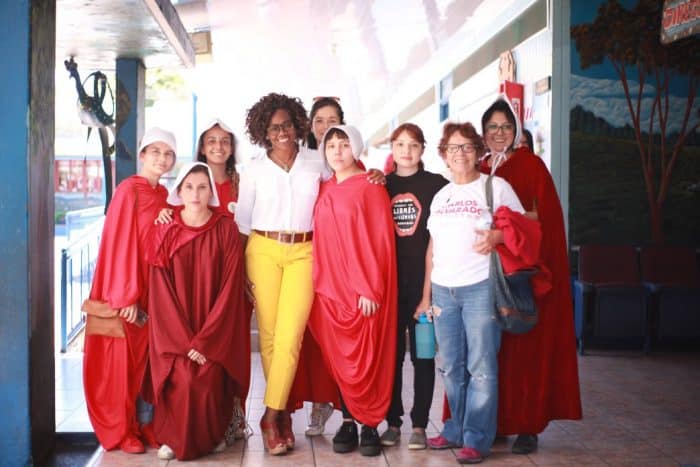The painting behind Epsy Campbell’s desk shows a lone sign reading “VAMOS,” from her 2014 presidential primary bid, in the middle of an urban shantytown. It’s just one reminder that the person much of the world met for the first time on April 1 – when she became the first black woman in the history of the Americas to be elected vice president – is a very familiar face in Costa Rican politics. So familiar, in fact, that Campbell tells us she didn’t realize the historic significance of her election until the following day when she saw the international headlines; for her, this was just the “next step” in her career.
Campbell, 54, is an economist who has represented the Citizen Action Party (PAC) in the Legislative Assembly twice (2002-2006 and 2014-2018), including a period as the party’s lead legislator in 2003-2004, and was the president of the party itself from 2005-2009.
She ran for vice president in 2006 as running mate to party founder Ottón Solís, and came within reach of Casa Presidencial: Solís ultimately lost to Oscar Arias, of the National Liberation Party (PLN), but the vote count was too close to call for weeks. Campbell threw her hat in the ring for a presidential candidacy on multiple occasions, but never won her party’s internal primary.
Campbell holds an undergraduate degree in economics and two Master’s degrees, one in international cooperation for development and the other in advanced political management and decision-making techniques. She is a widely published author and speaker. On the lighter side, her public Facebook page declares her to be a fan of Edith Piaf, Bob Marley, and “Thelma and Louise.”

The vice president-elect sat down with The Tico Times at her breezy office at the Legislative Assembly in San José on April 5 to discuss the emotions of Election Night and her plans for the next four years. (Since our conversation, President-elect Alvarado announced that Campell will also serve as the first female Foreign Minister in Costa Rican history; in Costa Rica, the two vice presidents typically hold a separate Cabinet position or other government role.)
Excerpts follow.
What did you feel when the Supreme Elections Tribunal (TSE) announced its first set of results on April 1?
My political life has not been short, but this was the most emotional result, the most heartfelt. This was an election, especially in the second round, where I and many people felt our country was at stake – the country we wanted, the country we thought we had. A country where there is space for everyone. It was two months of a lot of work and a lot of emotions.
I’d never before found so many people in the streets who almost begged me to win… it might take us a while to understand that this is a generation that is very aware that society is not just about the economy or general social stability. It has to do with identity and the certainty that the country where you live is a safe country, not just safe from crime. Sometimes when we talk about security, I think we go straight to whether someone stole our wallet or broke into our house to take away something that is ours. But there were Costa Ricans who felt their lives were not secure after the [first round of] elections, and those Costa Ricans had a house, had a car and had a job. They felt that a hostile environment was being created in their own country.
So I celebrated that first set of results with more emotion than ever in my life. I wanted to hug everyone and jump up and down.
Experience the moment for yourself with our 360 video:
https://www.facebook.com/TicoTimes/videos/1899159836790574/
Shortly afterward, you stepped onto that stage as the first Afro-descendant woman ever to become vice president in the Americas.
You’re not so aware of what you’re doing until you look back. I went up there simply as Epsy Campbell, the person I’ve always been. In those moments, you only think about what you are, one more person. You don’t tell yourself every day, “You’re afrodescendiente. You’re a mom.” You just are, and it was that happy woman – Afro-descendent, of course – who stepped up onto that stage.
The next day I started realizing, without being certain what was happening, that this was a historic moment not just in this country, but also throughout the Americas. I realized this because of international headlines and because they started calling me constantly from very different places: Brazil, Colombia, the United States, Spain. I said: What is going on? Because the truth is, I’ve become completely accustomed to my participation in Costa Rican politics, so of course, I took on the candidacy for the vice presidency and became the vice president-elect, and that was just the next step.
In addition, since I am a woman, it had become something bigger. I became aware the next day of how little progress, perhaps, we have made on a democratic level if in 2018 the Americas have such cause to celebrate an Afro-descendent female vice president. This should be normal on a continent with 200 million Afro-descendent people. This should be extremely normal in a country like Brazil where there are more than 100 million Afro-descendents. But it’s not normal. It’s an exception.
After so much struggle, the Afro-descendents of Latin America have representation for the first time on the level I will now attain with Carlos Alvarado, and that is symbolic.
Epsy Campbell will become Latin America’s first Afro-Latina vice president
The voting patterns in this election drew new attention to the huge inequalities between rural and urban Costa Rica. What are the administration’s priorities in terms of attention to rural economies, especially coastal zones?
We are creating regional development proposals for the first time… to generate jobs and leverage the capacity in every one of those areas, facilitating access to resources and productive activities. We are going to start with the poorest territories… through infrastructure, quality education, and an aggressive program of bilingualism.
Similarly, women’s rights also became a focal point of the election, especially because of the recent wave of femicides in the country. What are your priorities in addressing these issues?
The situation of women in Costa Rica, as in the rest of our region, requires extraordinary actions. We’ve been addressing them with ordinary actions… We need a more integrated approach to our Redes de Cuido [public childcare] so it can serve not only very poor women but also middle-class women… because the economic participation of women is barely 40 percent, and more of us are have been graduating from university than men for a decade. We’re not entering the job market.
In elementary and high school many of the best students in math are women, but at university they choose traditional, “feminine” majors. Eighty percent of our engineering, math and science graduates are men… We need to have our little girls do more robotics starting in elementary school, more research on new technologies.
This revolution will contribute to the country, because a country that is renouncing a significant part of its talent advances more slowly. Its GDP grows less.

While some people were thrilled by your victory, many voters – including plenty of voters who voted for your ticket, in all likelihood – are deeply disillusioned by government corruption. What will you do to address this?
The main thing in politics is to tell people the truth. People are tired of being lied to. We’ve put in place a series of ethical guarantees to ensure… transparency in all decisions. Every public official [in the Alvarado administration] will have to sign a code of ethics, and we have an absolute commitment to name highly qualified people to every position and have a more vigorous citizen audit. We can’t ignore the valuable work the [unofficial pro-Alvarado social movement] Coalición Costa Rica has done in terms of becoming true citizen auditors.
We also need to strengthen the Government Ethics Office and the mechanisms of accounting for our actions, and Carlos Alvarado is doing that. We’ll have a policy of absolutely austerity in public resources, at a time when our economic situation is so difficult.
So I want to encourage people who voted for the PAC, who voted for the National Restoration party… there are many issues in common. There is so much to do. Costa Rica has been given a new opportunity, and we won’t let you down.
President-elect unveils gender-balanced, multi-party Cabinet in Costa Rica






